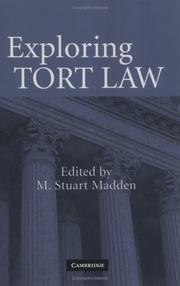| Listing 1 - 3 of 3 |
Sort by
|

ISBN: 0521616808 052185136X 1107154154 9786611108625 0511344953 0511344597 0511568193 0511610637 1281108626 0511344201 0511345291 9780521616805 9780511345296 9780511344596 9780511610639 9780521851367 Year: 2005 Publisher: Cambridge: Cambridge university press,
Abstract | Keywords | Export | Availability | Bookmark
 Loading...
Loading...Choose an application
- Reference Manager
- EndNote
- RefWorks (Direct export to RefWorks)
Independent of criminal or contract law, Tort law provides individuals and groups with redress for injury to every dimension of life from physical injury, to property damage, to personal insult. Over past decades no body of law within the civil justice system has experienced greater ferment than the law of Torts. In the US, state courts, federal courts, and the Supreme Court have all been active in the development of Tort policy. This edited collection comprises scholarship from many of today's most influential contributors regarding Torts and Compensation Systems scholarship. Topics include an investigation of the original stimuli for tort-type norms from ancient times onwards, a provocative analysis of five tort landmarks from MacPherson v. Buick Motor Co. to United States v. Carroll Towing Co, and a frank assessment of the limitations of torts within broader compensation systems goals.
Torts --- Torts. --- Tort and negligence --- United States --- Law --- General and Others --- Civil wrongs --- Delicts --- Injuries (Law) --- Quasi delicts --- Wrongful acts --- Accident law --- Actions and defenses --- Liability (Law) --- Obligations (Law) --- Negligence --- Reasonable care (Law) --- Torts - United States. --- United States of America
Book
ISBN: 9781479814183 9780814724712 081472471X 9780814724941 0814724949 1479814180 Year: 2016 Publisher: New York: New York University press,
Abstract | Keywords | Export | Availability | Bookmark
 Loading...
Loading...Choose an application
- Reference Manager
- EndNote
- RefWorks (Direct export to RefWorks)
Tort law regulates most human activities: from driving a car to using consumer products to providing or receiving medical care. Injuries caused by dog bites, slips and falls, fender benders, bridge collapses, adverse reactions to a medication, bar fights, oil spills, and more all implicate the law of torts. The rules and procedures by which tort cases are resolved engage deeply-held intuitions about justice, causation, intentionality, and the obligations that we owe to one another. Tort rules and procedures also generate significant controversy—most visibly in political debates over tort reform. The Psychology of Tort Law explores tort law through the lens of psychological science. Drawing on a wealth of psychological research and their own experiences teaching and researching tort law, Jennifer K. Robbennolt and Valerie P. Hans examine the psychological assumptions that underlie doctrinal rules. They explore how tort law influences the behavior and decision-making of potential plaintiffs and defendants, examining how doctors and patients, drivers, manufacturers and purchasers of products, property owners, and others make decisions against the backdrop of tort law. They show how the judges and jurors who decide tort claims are influenced by psychological phenomena in deciding cases. And they reveal how plaintiffs, defendants, and their attorneys resolve tort disputes in the shadow of tort law. Robbennolt and Hans here shed fascinating light on the tort system, and on the psychological dynamics which undergird its functioning.
Torts --- Psychological aspects --- LAW / Torts. --- Psychological aspects. --- Civil wrongs --- Delicts --- Injuries (Law) --- Quasi delicts --- Wrongful acts --- Accident law --- Actions and defenses --- Liability (Law) --- Obligations (Law) --- Negligence --- Reasonable care (Law) --- Torts - United States - Psychological aspects --- Etats-Unis

ISSN: 16168623 ISBN: 9783211244821 3211244824 9786610412204 1280412208 3211306315 Year: 2005 Volume: v. 16 Publisher: Wien: Springer,
Abstract | Keywords | Export | Availability | Bookmark
 Loading...
Loading...Choose an application
- Reference Manager
- EndNote
- RefWorks (Direct export to RefWorks)
Torts --- Liability insurance --- Liability (Law) --- Responsabilité civile --- Assurance de responsabilité civile --- Responsabilité (Droit) --- Insurance, Liability --- Law, General & Comparative --- Law, Politics & Government --- 05.04.a --- 13.01.ZZD --- Aansprakelijkheidsverzekering ; Algemeen --- Wettelijke en contractuele aansprakelijkheid ; Algemeen ; Meerdere landen --- Responsabilité civile --- Assurance de responsabilité civile --- Responsabilité (Droit) --- EPUB-LIV-FT LIVDROIT SPRINGER-B --- Insurance --- Indemnity against liability --- Insurance, Liability - Europe.Liability (Law) - Europe. --- Torts - Europe. --- Insurance, Liability - United States. --- Liability (Law) - Europe. --- Torts - United States.
| Listing 1 - 3 of 3 |
Sort by
|

 Search
Search Feedback
Feedback About UniCat
About UniCat  Help
Help News
News